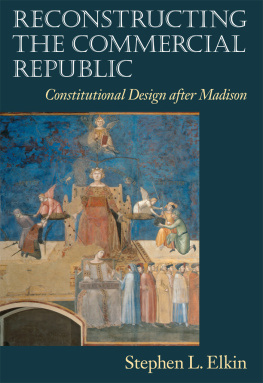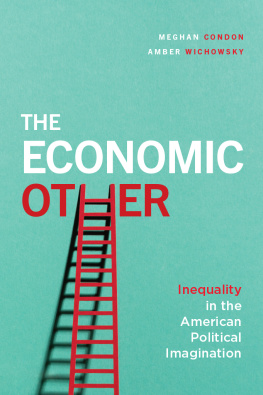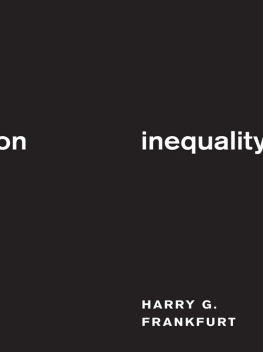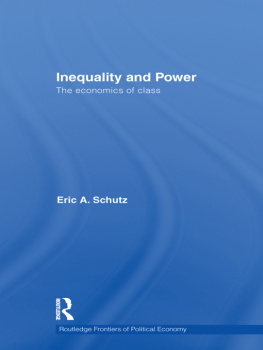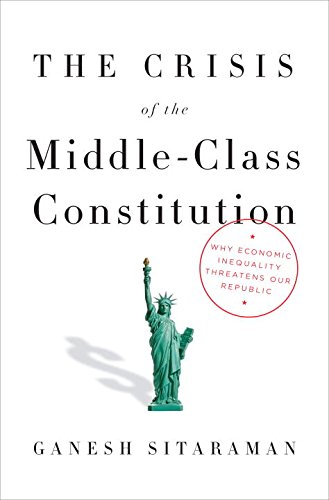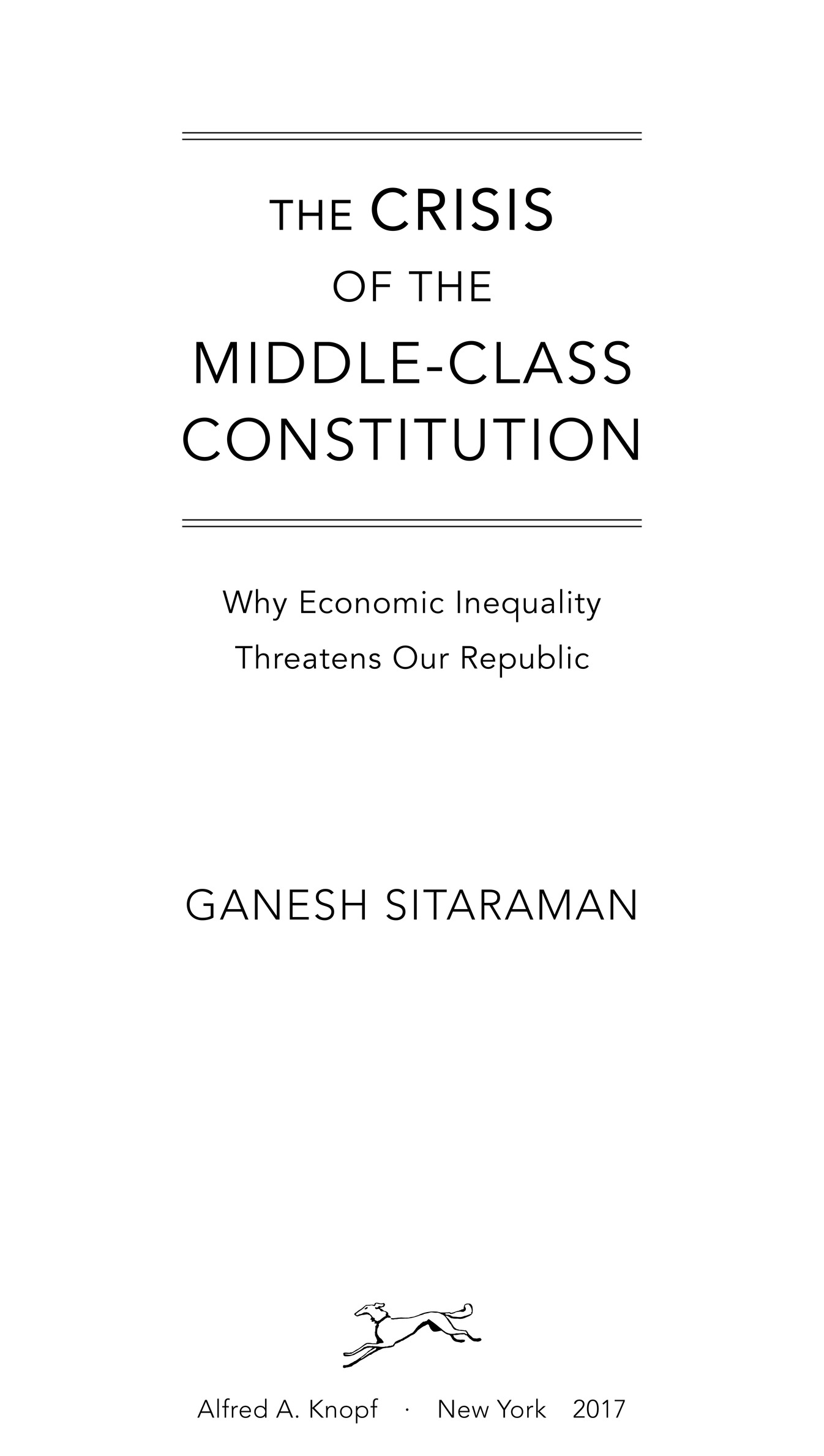Also by Ganesh Sitaraman
The Counterinsurgents Constitution: Law in the Age of Small Wars
THIS IS A BORZOI BOOK PUBLISHED BY ALFRED A. KNOPF
Copyright 2017 by Ganesh Sitaraman
All rights reserved. Published in the United States by Alfred A. Knopf, a division of Penguin Random House LLC, New York, and distributed in Canada by Random House of Canada, a division of Penguin Random House Canada Limited, Toronto.
www.aaknopf.com
Knopf, Borzoi Books, and the colophon are registered trademarks of Penguin Random House LLC.
Portions of this work first appeared, in different form, in the following publications: Americas Post-Crash Constitution originally published in Politico on October 5, 2014; Foreword, Drift and Mastery in the 21st Century published in Walter Lippmann, Drift and Mastery (University of Wisconsin Press, 2015); The Puzzling Absence of Economic Power in Constitutional Theory published in 101 Cornell Law Review 1445, in 2016; and Economic Structure and Constitutional Structure: An Intellectual History published in 94 Texas Law Review 1301, in 2016.
Library of Congress Cataloging-in-Publication Data
Names: Sitaraman, Ganesh, author.
Title: The crisis of the middle-class constitution : why economic inequality threatens our Republic / by Ganesh Sitaraman.
Description: New York : Alfred A. Knopf, [2017] | Includes bibliographical references and index.
Identifiers: LCCN 2016026242 (print) | LCCN 2016026710 (ebook) | ISBN 9780451493910 (hardcover) | ISBN 9780451493927 (ebook)
Subjects: LCSH: Constitutional law Economic aspects.United States. | EqualityEconomic aspects. | Income distributionUnited States. | Middle classUnited States. | United StatesSocial conditions. | Power (Social sciences) | Plutocracy.
Classification: LCC KF4749 .S58 2017 (print) | LCC KF4749 (ebook) | DDC 339.2/20973dc23
LC record available at https://lccn.loc.gov/2016026242
Ebook ISBN9780451493927
Cover design by Darren Haggar
Cover photograph by Gregor Schuster/Getty Images
v4.1
ep
Contents
Introduction
The number one threat to American constitutional government today is the collapse of the middle class. Not the rise of presidential power. Not the growing national security state. Not the gridlock in Washington. Not the polarization of the two political parties. These are all important developments that shape how our constitutional system works. But it is possible to have a functioning constitutional republic with slightly more presidential power, or with a bigger military, or with fewer acts of Congress, or with a more polarized electorate. It is much harder to have a functional constitutional republic without a strong middle class.
What does the middle class have to do with preserving a republican form of government? From the ancient Greeks onward, political philosophers were preoccupied with the problem of economic inequality and its relationship to the structure of government. The wealthy elites would clash with everyone elsethe rich oppressing the poor, the poor seeking to confiscate and redistribute the wealth of the rich. Economic inequality led inevitably to political inequality and, as a result, instability, class warfare, and constitutional revolution.
Statesmen and philosophers therefore went to considerable lengths to design governments that would not fall prey to the tumults that accompanied economic inequality. The great republics throughout historyRome, Florence, Venice, Englandall had what we can think of as class warfare constitutions, governments designed on the assumption that economic inequality was inevitable and the clash between rich and poor inescapable. Class warfare constitutions experimented with many different designs to prevent economic conflict from spilling into constitutional revolution: Statesmen empowered special tribunes, representatives of the people, not drawn from the patrician class. They created bodies that represented different classes of people. And they sought to balance class power to prevent any one economic group from dominating the political system. Class warfare constitutions took as a premise that inequality would exist in society, and because inequality was a threat to stable government, they built checks into the constitutional structure itself.
The American Constitution is different. Our Constitution isnt based on the assumption that class conflict is inevitable. Our Constitution is a middle-class constitution. Unlike the class warfare constitutions of earlier times, our Constitution assumes relative economic equality in society; it assumes that the middle class is and will remain dominant. The framers of the Constitution were well aware of the history of statesmen and theorists grappling with class warfare. But they did not adopt a design premised on the inevitability of class conflict. In fact, our Constitution does not have a single provisionnot onethat explicitly entrenches economic class into the structure of government. There is no provision excluding poor people from the Senate, and no provision excluding the rich from the House of Representatives. Class warfare constitutions had these kinds of features.
Instead, from the time of the American Revolution through the creation of the Constitution, many Americans believed that the New World was unique because it had relative economic equality. There was neither extreme wealth nor extreme poverty, as was common in Europe. In fact, when compared with Europe, Americas special providence was clear: no feudalism, no nobility, and no aristocracy-supporting land inheritance policies. Americans, as Alexis de Tocqueville would later say, were born equal rather than becoming so. Americans understood and talked about this fact throughout the founding era, including during the debates over the ratification of the Constitution. Because the new American nation had readily available land to the west, there would be economic opportunity for anyone to own property and build an economic future. Of course, all of this was within the confines of the eras views on equality between men and women and between races (more on that to come), but the big picture is that for two thousand years class warfare defined the design of government. Then America came along.
The problem today is that the basic foundation upon which our middle-class constitution was builtthe prerequisite of relative economic equalityis crumbling. More than eight years after the financial crash, disparities in economic power are at the forefront of popular debate. There is widespread concern about rising inequality and the increasing share of wealth going to the top 1 percent and 0.1 percent of people. In the past generation, the average worker hasnt seen his income rise; adjusted for inflation, its been stagnant. People are working harder and harder, with gains in productivity and rising GDP but without an increase in wealth or economic security. Economic inequality is also turning into political inequality. Political leaders increasingly express a growing popular sentiment that the system is rigged to work for wealthy and corporate interests, who have the means to buy influence through campaign funding and then sustain their influence with armies of lobbyists in Washington. This outrage also isnt partisan: it comes from both the populist right and the progressive left.


